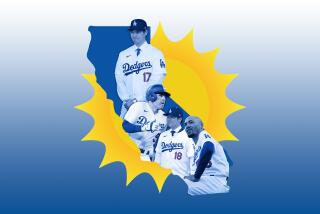AHL Knows When the Puck Is in Its Zone
- Share via
This is far from being a veiled marketing tactic. The Chicago Wolves are trying to make a point -- and a buck. The American Hockey League franchise’s campaign is plain and simple:
“See Hockey the Way It Was Meant to Be: Played!”
Translation: There is money to be made in times of chaos, and the AHL -- the top development league for the lockout-idled NHL -- is looking for a cha-ching season.
In the AHL, cost certainty is reality. Teams have low overhead -- nearly all player salaries are paid by NHL teams -- and travel sometimes involves a bus and a cheap motel.
In the AHL, the lockout is an opportunity. The NHL and AHL have an agreement separate from the collective bargaining agreement, allowing reassignment of NHL players who do not have to clear waivers to affiliates in the AHL, where they will play as long as the lockout lasts.
In the AHL, old-fashioned chutzpah flourishes. The Wolves have done more than introduce a finger-pointing marketing slogan, they are banking on a long lockout, offering season-ticket holders full refunds if the NHL and the NHL Players’ Assn. come to a new collective bargaining agreement.
So the 28-team AHL, the top development league for the NHL, is even more the place to be this season. At least according to those already in it.
“I look around this league and I see all these guys who were in the NHL last season,” said King forward Mike Cammalleri, who is playing for Manchester, the Kings’ minor league team in New Hampshire. “It’s really strange, but it beats sitting at home.”
Besides, Cammalleri said, “This is going to be the best league in the world, with the NHL locked out.”
Hockey fans in Southern California can judge for themselves.
Manchester will play Utah at Staples Center tonight at 7:30 in what was originally planned as a “Hockey Day L.A.” promotion. The Kings, Manchester and a youth team were scheduled to play in a tripleheader. But with “No Hockey in L.A.” every day, Manchester has become the main draw.
The Ducks are planning to bring Cincinnati, their AHL affiliate, to the Arrowhead Pond for a few games.
Such visits already have paid off. In Nashville, 10,642 bought $10 tickets to see Milwaukee, the Predators’ affiliate, play Rochester last Saturday. In Edmonton, 16,000 Canadians got their hockey fix at the Edmonton Road Runners’ home opener last week.
“We would rather have the NHL playing, but there is certainly a window of opportunity for us to play to a larger audience and on a larger stage,” AHL President Dave Andrews said. “ ... It is something to take advantage of right now.”
The Wolves, whose home arena is in the suburb of Rosemont, Ill., tried to chisel away the NHL Chicago Blackhawks’ dwindling fan base even before the lockout began, starting a marketing campaign last spring.
Team officials said they had sold 150,000 tickets before the season began. The Wolves drew 320,000 fans last season.
Still, this is touchy territory, and the Wolves, an affiliate of the NHL’s Atlanta Thrashers, are being careful not to bite the hand that feeds them.
General Manager Kevin Cheveldayoff, seemingly uncomfortable with questions about the marketing campaign, said: “Our marketing, maybe it seems edgy. The truth of the matter is, from a hockey standpoint, the marketing department doesn’t get involved with the hockey operations. It is two different, distinct sides of the organization.”
Cheveldayoff added: “It’s our responsibility to grow the game in Chicago. We have helped introduce hockey to new fans, who sometimes go on to be Blackhawk fans.”
And with the Blackhawks down? Well, Cheveldayoff said, the Wolves set attendance records during the last lockout, in 1994-95, even though the NHL was back playing in January that season. AHL teams in Philadelphia and Edmonton are expecting a similar bounce, and so are teams within driving distance of Boston, New York and Toronto.
The talent infusion figures to help.
Promising NHL talent dots every roster. About 400 of the AHL’s 700 players played in the NHL last season, Andrews said. Some are considered future NHL stars.
“There are guys now in this league that were on first power-play units for NHL teams last season,” Cincinnati Coach Brad Shaw said.
All of which comes at hometown prices. Nearly all AHL players are under two-way contracts with NHL teams and earn substantially less if they are in the minor league.
Many AHL teams also receive money for being affiliated with an NHL club. Other AHL teams are owned by the parent club, as is Manchester’s case with the Kings, and team expenses are part of the NHL club’s budget. With less money needed for payroll and travel expenses that are minuscule, compared with NHL costs, most AHL teams turn a profit.
This season, that profit could be considerably more.
More to Read
Go beyond the scoreboard
Get the latest on L.A.'s teams in the daily Sports Report newsletter.
You may occasionally receive promotional content from the Los Angeles Times.







